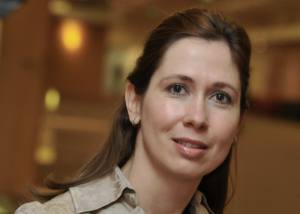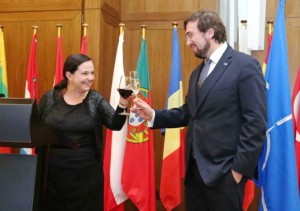Barbora Maronkova became director of the NATO Information and Documentation Centre, known as NIDC, in Kyiv on March 1.
Maronkova, a native of Slovakia, replaces Natalia Nemyliwska, a Canadian citizen who held the job for six years. The top job goes to a citizen of a NATO member country.
Maronkova most recently worked 10 years at NATO headquarters in Brussels, Belgium, where her experience included work in public diplomacy, the press office and in developing new communication concepts and programs for the military-political alliance made up of 28 member nations. In 2003, she established and headed a Slovak-based NGO Centre for European and North Atlantic Affairs to contribute to debate on Slovakia’s membership to the European Union and NATO, which Slovakia joined in 2004.
She is also a non-resident research fellow at the University of Southern California’s Center on Public Diplomacy, where she writes a blog.
In a Feb. 1 blog, headlined “NATO in an era of fake news and disinformation,” she wrote that “the deliberate manipulation of facts has become a sad, everyday reality—not just in Russia and Ukraine, but in Europe and the United States too. Organizations like NATO increasingly find themselves the subject of disinformation campaigns by state and non-state actors alike — a real challenge for those whose job it is to communicate messages on the basis of fact.”
She wrote that: “Fortunately for us all, there are still enough journalists, key opinion leaders, and experts who do care about the truth. NATO cannot let them down. It needs to continue to fight the good fight—insisting on truthful reporting, reaching out to media outlets for corrections, and being consistent and honest in everything it says…If we want people to hear and believe what we say, we first need to earn their trust.”

Barbora Maronkova started on March 1 as director of the NATO Information and Documentation Centre in Ukraine. She replaced Natalia Nemyliwska, who served for six years. (Courtesy)
NIDC this year will celebrate its 20th year in Ukraine with events leading up to the NATO-Ukraine partnership signed on July 9, 1997.
Assisting Ukraine with public diplomacy and strategic communications, particularly in defense and security reforms, are key missions of the six-person office. It also is involved in conferences, awarding public diplomacy grants and conducting press tours to Brussels for journalists in Ukraine. Kyiv Post journalists have participated in these programs and NIDC was a partner of the newspaper’s annual Tiger Conference in 2016.
Since 1999, NATO has also operated a Liaison Office, which supports the alliance’s cooperation with Ukraine across the entire military and political spectrum and contributes advice and expertise to reforms under way in Ukraine’s security and defense sector. Since the beginning of Russia’s war against Ukraine, the NATO Liaison Office has grown significantly and now numbers 42 staff members, including 18 expatriates with diplomatic status.
Reflecting NATO’s increased support to Ukraine, the NATO Representation to Ukraine was created a year ago and accredited as a full diplomatic mission. The mission consists of the NATO Liaison Office and the NATO Information and Documentation Centre.
President Petro Poroshenko has stated his goal of having Ukraine become ready to join NATO by 2020, and last month suggested holding a referendum to gauge public sentiment on the issue.
After Russia militarily invaded Ukraine, taking its Crimean peninsula and instigating a war in the eastern Donbas that goes on today, NATO has stepped up its financial and other assistance to Ukraine. It now operates several new trust funds, with approximately 5 million euros pledged, to help Ukraine in five areas: command, control, communications and computers; logistics and standardization; cyber defense, medical rehabilitation and military career transition.
Russia’s war against Ukraine has prompted NATO members to beef up their defenses even more, spending $10 billion more on the military collectively than last year, and deploying troops to the member states near Russia, including the three Baltic nations and Poland.
On Sept. 22, 2015, NATO Secretary General Jens Stoltenberg and Ukrainian National Security and Defense Council Secretary Oleksandr Turchynov signed the Strategic Communications Partnership Roadmap between the two entities.

Natalia Nemyliwska, director of the NATO Information and Documentation Centre, and Alexander Vinnikov, head of the NATO Representation to Ukraine, on April 7, 2016, in Kyiv toast to NATO’s 67th birthday. The political-military alliance’s founding treaty was signed on April 4, 1949. (Courtesy)
Nemyliwska, the former NIDC head, said in an interview before her departure that “one of the main objectives has been to help Ukraine begin thinking about strategic communications in a broad, systemic and structural way.”
On that score, she said, Ukraine has made “very substantial progress” in incorporating strategic communications into various policies, including its Strategic Defense Bulletin adopted last year, a military blueprint to carry out reforms based on NATO standards.
The NATO strategic communications assistance is “structured along 3 lines – strategic, operational and tactical support,” she said.
She defines strategic communications as a system of “synchronized, coordinated, coherent communications” that spreads Ukraine’s message to the public effectively and that all involves all ministries in government taking an active part.
The strategy “stays regardless of who is in power,” Nemyliwska said. For Ukraine, the goals and message include “defeating Russia and establishing Ukraine as a country that has its own voice and its own direction and is communicating that to foreign audiences.”
Russia’s war and disinformation campaigns have challenged Ukraine in unprecedented ways.
“The Kremlin is producing these narratives, myths and lies and falsifications faster than Ukraine can react to them,” Nemyliwska said. “Should you really react to them? The focus should be on building Ukraine’s story. That is the greatest antidote to Russia’s propaganda.”
Nemyliwska said that, during her tenure, Ukraine became much more interested in its partnership with NATO. But there’s still much to do, she said, before the nation can hope to join the political-military alliance.
Understanding democratic principles, including the importance of civilian control over the military, are among the NATO values that Ukraine must absorb if it aspires to eventual membership. “The values of consensus and the values that NATO has, this is also something that is in need of being communicated to the Ukrainian public,” she said.
In an interview last year, Nemyliwska expressed confidence that Ukraine will successfully counter Russian propaganda.
